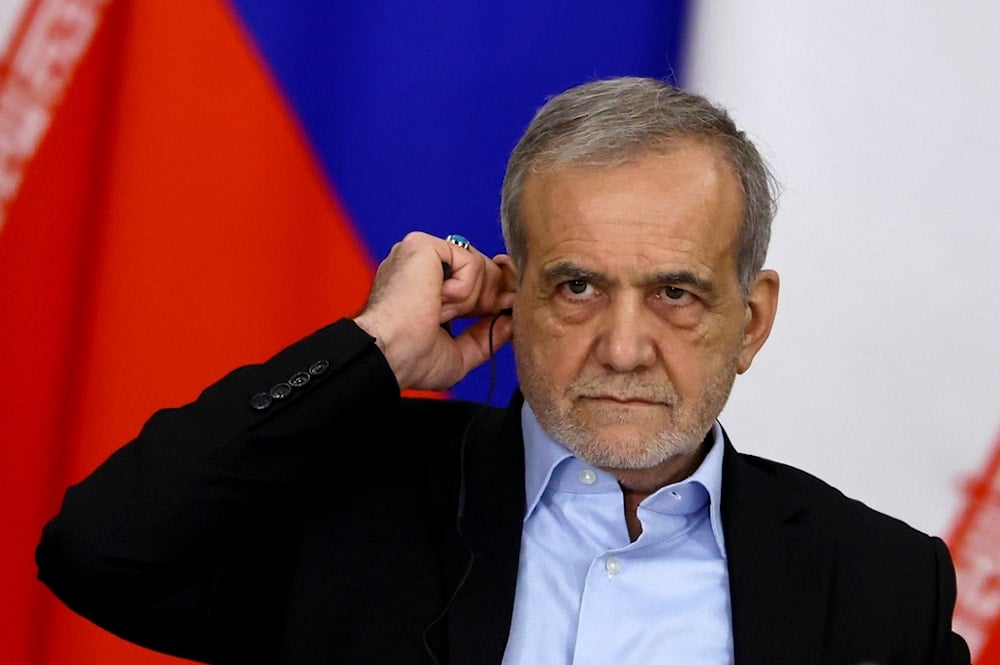Iran unfazed by Trump's oil export threats: Pezeshkian
The Iranian President reflected on how Iran is not solely dependent on oil revenues and possesses various economic alternatives.
-

Iranian President Masoud Pezeshkian attends a signing ceremony with Russian President Vladimir Putin at the Kremlin in Moscow, Russia, Friday, January 17, 2025. (AP)
Iranian President Masoud Pezeshkian on Wednesday dismissed US President Donald Trump's recent remarks vowing to bring Iran's oil exports to zero. Speaking at a cabinet meeting, Pezeshkian reflected on how Iran is not solely dependent on oil revenues and possesses various economic alternatives.
"They think that everything we do depends on oil so they can stop it, while there are many other ways," the Iranian president stated, rejecting the notion that US sanctions could cripple Iran's economy. He noted that the country has generated significant revenue through energy exports to a diverse range of international buyers.
Pezeshkian further asserted Iran's economic resilience, declaring, "We are a powerful country, and our reserves and resources are exceptional in the world." He argued that despite ongoing US sanctions, Tehran is capable of sustaining its economy through strategic resource management. "The United States is sanctioning us, but if we manage our own resources, we will solve our problems," he added.
His comments were a direct response to Trump's warning the previous night about eliminating Iran's oil exports. Reaffirming Tehran's ability to withstand external pressure, Pezeshkian stated, "They think everything we do depends on oil and they want to stop it," but maintained that Iran has alternative economic strategies.
Nuclear allegations denied
The confrontation is the latest escalation in the long-standing dispute between Washington and Tehran. Earlier in the day, Iranian officials also responded to Trump's revival of the "maximum pressure" campaign, particularly his claim that Iran seeks nuclear weapons. Mohammad Eslami, head of Iran's Atomic Energy Organization (AEOI), rejected the accusation outright, stating:
"Trump has said that Iran should not have nuclear weapons; Iran had no intention of obtaining nuclear weapons, does not have and will not have."
He emphasized that Iran's nuclear program remains within the framework of the Nuclear Non-Proliferation Treaty (NPT), and Iranian Foreign Minister Abbas Araghchi reinforced this stance, stating that maximum pressure "is a failed experiment, and its reimposition will only lead to another failure."
Diplomatic overtures
Trump, while reinstating his maximum pressure strategy, also signaled his willingness to negotiate a "verified nuclear peace agreement" with Tehran. "I want Iran to be a great and successful country, but one that cannot have a Nuclear Weapon," he stated, adding that he would prefer a diplomatic resolution to the standoff.
However, Iran has responded cautiously to the overture. Government spokeswoman Fatemeh Mohajerani stressed that Iran's foreign policy is based on principles of dignity, wisdom, and expediency, while a senior Iranian official told Reuters that any future negotiations would require the US to "rein in Israel" if Washington truly seeks a meaningful agreement.
Read more: Trump shelves 'Israel' plans to attack Iran, Maariv reports
The Trump administration's renewed sanctions come as part of a broader effort to curb Iran's regional influence, including its ballistic missile program and alliances across the Middle East. However, rather than deterring Iran, US pressure has led Tehran to advance its nuclear program, enriching uranium to 60%—a step closer to weapons-grade levels.
Nuclear analysts warn that Iran could produce enough material for multiple nuclear bombs in just two weeks, but Iranian officials insist that their nuclear ambitions remain purely peaceful.

 3 Min Read
3 Min Read










